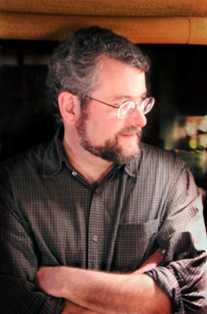 Paul Russell is the author of six novels, including Sea of Tranquillity, The Coming Storm and, most recently, The Unreal Life of Sergey Nabokov (Cleis Press, November 8, 2011), based on the life of the gay brother of Vladimir Nabokov. A professor at Vassar College, Russell lives in upstate New York in an old farmhouse he shares with four badly behaved cats and tends a chaotic flower garden in his spare time.
Paul Russell is the author of six novels, including Sea of Tranquillity, The Coming Storm and, most recently, The Unreal Life of Sergey Nabokov (Cleis Press, November 8, 2011), based on the life of the gay brother of Vladimir Nabokov. A professor at Vassar College, Russell lives in upstate New York in an old farmhouse he shares with four badly behaved cats and tends a chaotic flower garden in his spare time.
On your nightstand now:
I've just finished Ginny Bailey's striking debut novel, Africa Junction, a disturbing and moving look at the intertwined destinies of several lost souls as they traverse England, Liberia and Senegal over three difficult decades. It's not yet been published in the U.S., but it's well worth trying to find a copy. Next on my pile is Keith Scribner's The Oregon Experiment.
Favorite book when you were a child:
Ray Bradbury's The Martian Chronicles (see below); also Arthur Clarke's Childhood's End (I went through an intense science fiction phase between the ages of 11 and 14). One of my fondest memories from childhood is of my dad reading aloud to me from the Golden Book editions of The Iliad and The Odyssey.
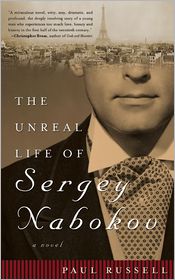 Your top five authors:
Your top five authors:
I absolutely love the difficult, challenging modernists. I go back to them again and again: Joyce, Proust, Mann, Woolf, Nabokov. I also adore Dickens. The Pickwick Papers is unadulterated pleasure from beginning to end, the greatest comic novel ever.
Book you've faked reading:
I've never been able to get through The Brothers Karamazov, though I've tried on several occasions. The prose, at least in translation[s], seems maddeningly careless and inexact. Someone once called Dostoevsky a genius without talent; that seems about right.
Book you're an evangelist for:
Mark Merlis's extraordinarily original and off-beat An Arrow's Flight--the Trojan War as seen from the perspective of a gay bar.
Book you've bought for the cover:
(Sheepishly) ...I thought the original cover for Edmund White's A Boy's Own Story enormously attractive.
Book that changed your life:
Ray Bradbury's The Martian Chronicles. I still vividly remember reading this book when I was 11; it cast a spell on me like nothing ever had before. For days afterward, I felt feverish, disoriented, changed. A sense of simply not knowing what to do with myself. Even today, those symptoms follow after I've finished a great book. I remember similar feelings on completing Thomas Mann's Buddenbrooks, J.L. Carr's A Month in the Country and William Maxwell's So Long, See You Tomorrow.
Favorite line from a book:
Most writers would have written the following sentence and been content: "Here, stopping for a moment by the stone urn which held the geraniums, he saw his wife and son, together, in the window." This is the way Virginia Woolf writes it in To the Lighthouse: "Here, stopping for a moment by the stone urn which held the geraniums, he saw, but now far, far away, like children picking up shells, divinely innocent and occupied with little trifles at their feet and somehow defenseless against a doom which he perceived, his wife and son, together, in the window." The literal action remains unchanged, but the addition of that simile deepens the moment immeasurably, and makes an otherwise unremarkable gesture utterly heartbreaking.
Book you most want to read again for the first time:
Finnegans Wake.
Neglected writers you'd like to see more widely read:
Jonathan Strong, Sylvia Townsend Warner, Glenway Wescott, Molly Keene, James McConkey.
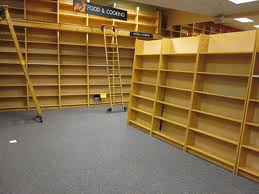 "It's the only retail industry I can think of that will go full circle, back to the way it originally was. From the small-village bookstore to the big-box retailer and then back again. That doesn't ever happen in retail."
"It's the only retail industry I can think of that will go full circle, back to the way it originally was. From the small-village bookstore to the big-box retailer and then back again. That doesn't ever happen in retail."









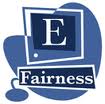 The American Booksellers Association expressed its support for the Marketplace Fairness Act, which was introduced this week by a bipartisan group of U.S. senators (
The American Booksellers Association expressed its support for the Marketplace Fairness Act, which was introduced this week by a bipartisan group of U.S. senators (
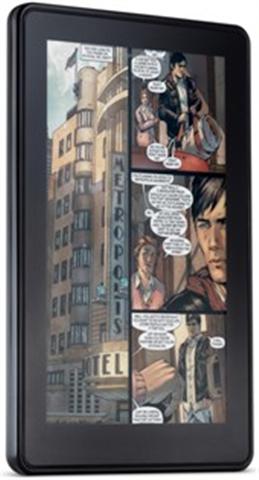 TechCrunch called the order change "
TechCrunch called the order change "
 The economic crisis in Greece, which continues to be headline news worldwide, has had a profound impact on the country's book trade.
The economic crisis in Greece, which continues to be headline news worldwide, has had a profound impact on the country's book trade. 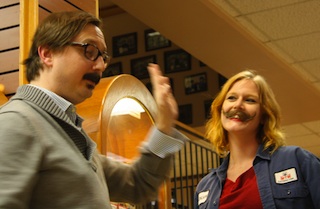 On Tuesday BookPeople, Austin, Tex., held its first mustache contest in celebration of That Is All by the mustachioed John Hodgman (Dutton), the final book in the trilogy of Complete World Knowledge. Hodgson (l.) and the store judged the event.
On Tuesday BookPeople, Austin, Tex., held its first mustache contest in celebration of That Is All by the mustachioed John Hodgman (Dutton), the final book in the trilogy of Complete World Knowledge. Hodgson (l.) and the store judged the event.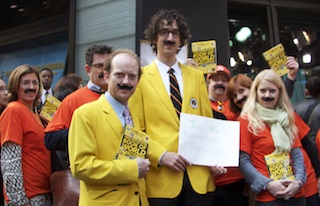 The occasion was the release of The RecordSetter Book of World Records: More Than 300 Extraordinary Feats by Ordinary People by Dan Rollman and Corey Henderson (founder of the site), which has the full stories of some of the quirky, cool and hilarious records chronicled on RecordSetter.com.
The occasion was the release of The RecordSetter Book of World Records: More Than 300 Extraordinary Feats by Ordinary People by Dan Rollman and Corey Henderson (founder of the site), which has the full stories of some of the quirky, cool and hilarious records chronicled on RecordSetter.com.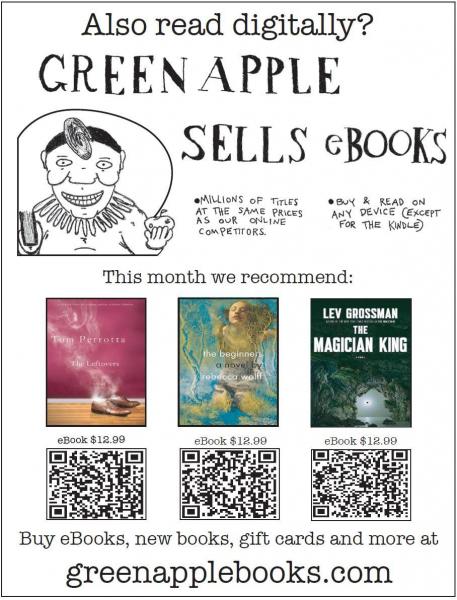 Bookselling This Week spoke with three independent booksellers about their
Bookselling This Week spoke with three independent booksellers about their  An autographed guitar that Beatles legend
An autographed guitar that Beatles legend 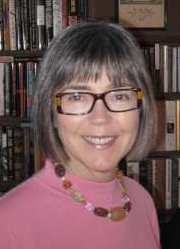
 "
"
 Your top five authors:
Your top five authors: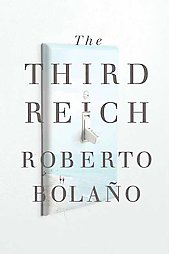 Roberto Bolaño (Savage Detectives and 2666) was at least as enigmatic in person as the people he wrote about. This novel, written in 1989, was found in his belongings after his death in 2003, at age 50, and was serialized in the Paris Review in the spring of 2011. It is rumored that there are two more completed manuscripts waiting to see the light.
Roberto Bolaño (Savage Detectives and 2666) was at least as enigmatic in person as the people he wrote about. This novel, written in 1989, was found in his belongings after his death in 2003, at age 50, and was serialized in the Paris Review in the spring of 2011. It is rumored that there are two more completed manuscripts waiting to see the light.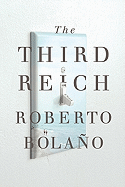
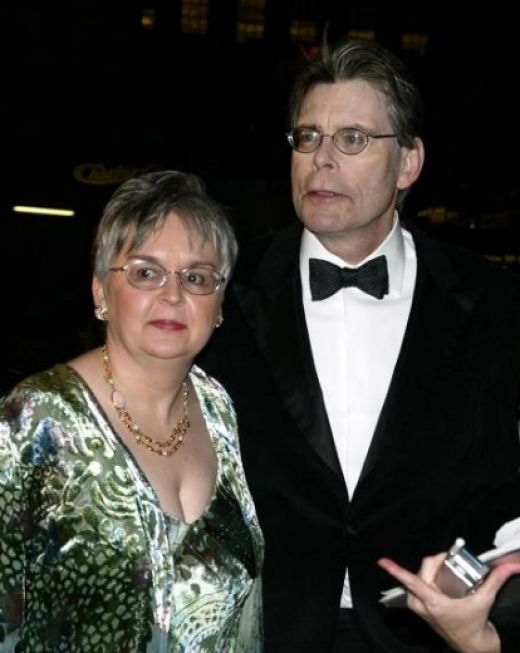 I started thinking about this yesterday morning when I read a
I started thinking about this yesterday morning when I read a